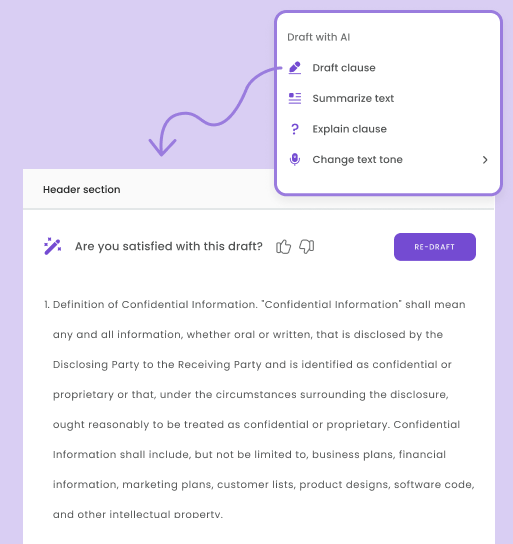There are countless situations in which you’ll need someone to provide a service for you or your business. Oftentimes, due to the nature of that service, you’ll want to create a service contract to protect yourself and your interests.
Do you know what should be included in a service contract and what is unnecessary? In this guide, you’ll get a deeper understanding of what a service contract is, its key elements and considerations, the benefits it brings, and multiple best practices to take advantage of.
Let’s dive in.
Definition of a service contract
A service contract is a legally binding agreement between two or more parties. It outlines the terms and conditions for the provision of services. It establishes the obligations, responsibilities, and expectations of the service provider and the recipient of the services.
Service agreements are used in many industries. These include but aren’t limited to maintenance and repair services, consulting, and outsourcing. Essentially, any service provider can create a service contract.
Service contracts are a bit different from other types of common contracts in a few key areas:
- Focus on services: A service contract is usually made to deliver services. Goods or employment are not involved in the contract. The agreement is to define the expectations of the services delivered such as the scope, quality, timelines, etc. of the services provided.
- Absence of transfer of ownership: In this kind of agreement, no product needs to transfer ownership. A service contract focuses on the performance of a specific service, delivering certain expertise, or other activities.
- Intangible deliverables: Intangible deliverables are things that don’t have a physical form but can still be measured. For example, giving advice, any type of expertise, and certain types of labor qualify as intangible. Of course, tangible aspects can be included within the deliverables. For example, in a service contract to create a pool, a large portion of what you pay for is labor – an intangible deliverable but the pool is a tangible deliverable.
Common elements and characteristics of service contracts:
Service contracts typically include the following elements and characteristics:
- Parties involved: Service agreements identify the parties entering into the agreement, typically the service provider and the recipient of the services. It may also include provisions for subcontractors or third-party service providers.
- Scope of services: The contract defines the scope and nature of the services to be provided. It outlines the specific tasks, activities, or deliverables that the service provider will perform.
- Duration and timelines: Service contracts specify the start and end dates of the contract, as well as any specific milestones or timelines for the completion of services or project phases.
- Compensation and payment terms: The contract outlines the agreed-upon compensation or fees for the services rendered. It may include details about payment terms, invoicing procedures, and any additional costs or expenses that may be incurred.
- Terms and conditions: Service agreements include terms and conditions that govern the relationship between the parties. This may include provisions related to confidentiality, intellectual property rights, warranties, termination, dispute resolution, and limitations of liability.
- Performance standards and quality requirements: The contract may establish performance standards, service levels, or quality requirements that the service provider must meet. This ensures that the services are delivered to the expected standards.
Service contracts are important for clarifying expectations, protecting the rights of both parties, and ensuring a mutually beneficial relationship between the service provider and the recipient of services. They provide a framework for effective service delivery, help mitigate risks, and establish the foundation for successful service-based engagements.
Types of service contracts
Service contract come in many shapes and sizes. Of course, there are many things that remain the same between service contract. There are also many things that change based on the type of contract you choose. Below are a few types of service agreements but keep in mind that there are many more.
- General service contracts: Since it’s a general service contract, it can be used for a wide range of scenarios. These range from simple labor, complex repairs and installations, to yard work. It doesn’t have industry specific language and instead is focused on the terms of the service and key deliverables.
- Professional service contracts: These types of service contracts are focused on professional trades. It includes attorneys, certain types of consultants, financial advisors, accountants, etc. It defines fees, the scope of the services, regulations that apply, and professional standards. They outline the scope of professional services to be provided, the fees, and any specific professional standards or regulations that apply.
- Maintenance service contracts: You’re more likely to encounter these kinds of contracts in larger facilities, organizations that handle a lot of equipment, and even some software vendors. It focuses on defining the rules and obligations for regular maintenance, repairs, and even technical support. The terms an inlude everything from frequence of maintenance to response times and quality of service.
- Consulting service contracts: This is a specialized service contract in which epxertise is made available to the client. It defines the entire scope of the services provided, the expected deliverables, the remuneration, IP ownership, and others.
- Managed service contracts: A managed service is one in which you outsource the complete management and operation of a certain function within a business to an external provider. A contract of this nature defines the scope, obligations, and even performance metrics.
- Subscription service contracts: Subscription service agreements can be similar to maintenance service contracts. The difference is that it’s only focused on services that recur. These include software subscriptions, membership services, digital content subscriptions, etc. They outline the terms of the subscription, including duration, fees, payment terms, and cancellation policies.
- Software as a Service (SaaS) contracts: SaaS contracts govern the use of cloud-based software services. They define the rights and obligations of the software provider and the user, including access, usage, data security, support, and any service-level commitments.
- Service level agreements (SLAs): SLAs are not standalone contracts but are often included within service contracts. They define the specific service levels, performance metrics, response times, and penalties or remedies if service levels are not met. SLAs help ensure that service providers deliver services as agreed upon.
It’s important to note that these are general categories, and specific service agreements can vary in their terms and conditions based on the nature of the services and the unique requirements of the parties involved. Tailor the contract language and provisions to their specific industry, services, and business needs.
Key considerations in service contracts
Identifying parties involved and their roles:
- Clear identification: Clearly identify all parties involved in the contract, including the service provider(s) and the recipient(s) of the services. This ensures that the roles and responsibilities of each party are explicitly stated.
- Roles and obligations: Clearly define the specific roles, obligations, and responsibilities of each party. This includes the obligations of the service provider in delivering the services and the obligations of the recipient in providing necessary cooperation or access to relevant resources.
Scope of services and deliverables:
- Detailed description: Provide a detailed description of the services to be provided. Clearly specify the tasks, activities, or deliverables that are within the scope of the services.
- Service specifications: Define the specifications, standards, or quality requirements for the services. This helps ensure that both parties have a common understanding of what is expected.
Duration and termination provisions:
- Contract duration: The contract duration is where you specify the start date, end date, and any specific milestones or phases. Clearly define the contract duration to ensure that both parties understand the timeline and expectations for service delivery.
- Termination provisions: Include provisions for termination, outlining the circumstances under which either party can terminate the agreement. Detail the notice period required and any associated fees or penalties for early termination.
Payment terms and pricing structure:
- Payment terms: Clearly state the payment terms, including the frequency of payments, due dates, and acceptable payment methods.
- Pricing structure: Define the pricing structure for the services, whether it’s a fixed fee, hourly rate, project-based, or any other agreed-upon pricing model. Specify if there are additional costs or expenses that may be incurred and how they will be handled. For example, does the service provider pay for materials and get reimbursed from you, is it part of their fee, or do you provide materials?
Intellectual property rights and ownership:
- Ownership of intellectual property: Address ownership of any intellectual property created or used during the provision of services. Clearly define the ownership rights, whether it will remain with the service provider, be transferred to the recipient, or be jointly owned.
- Usage rights and restrictions: Specify any limitations on the use, reproduction, or distribution of intellectual property, including any licensing arrangements.
Confidentiality and non-disclosure agreements:
- Confidentiality obligations: Include provisions that require both parties to keep confidential information exchanged during the course of the contract confidential and not disclose it to third parties.
- Non-disclosure agreements: Consider including a separate non-disclosure agreement (NDA) to further protect confidential information, if necessary.
Indemnification and limitation of liability:
- Indemnification: Define the indemnification obligations, where one party agrees to compensate the other for any losses, damages, or claims arising from the provision or use of services.
- Limitation of liability: Address the limitation of liability to protect both parties from excessive liability, including any monetary limits or exclusions of certain types of damages.
Governing law and jurisdiction:
- Governing law: Indicate the state or jurisdiction under which the contract will be enforced. This is the court system that will be used if there is a dispute and the law which will take precedence when interpreting and enforcing the contract.
- Jurisdiction: Specify the jurisdiction where any legal disputes arising from the contract will be resolved.
- Dispute resolution clause: Include a clause that outlines the process for resolving disputes, whether through negotiation, mediation, arbitration, or other agreed-upon methods.
These considerations help ensure that service contracts are comprehensive, protect the interests of both parties, and provide a clear framework for the provision of services. It’s advisable to seek legal advice to draft and review service contracts to ensure compliance with applicable laws and regulations.
Benefits and challenges of service contracts
Advantages of using service contracts:
- Clarity and certainty in service expectations: Service agreements provide clear documentation of the agreed-upon services, deliverables, and performance expectations. This clarity helps prevent misunderstandings and ensures that both parties have a shared understanding of what is expected.
- Protection of rights and obligations for both parties: Service contracts outline the rights and obligations of each party, providing legal protection for both the service provider and the recipient of services. This helps establish accountability and mitigates risks for both parties involved.
- Opportunities for customization and flexibility: Service contracts can be customized to meet the unique needs of the parties involved. They allow for specific terms and conditions, pricing structures, and service levels to be negotiated and agreed upon, providing flexibility in tailoring the contract to suit the specific requirements of the engagement.
- Establishing a foundation for good business relationships: Service agreements serve as a professional framework for business relationships. They establish clear expectations, responsibilities, and procedures, fostering transparency, trust, and professionalism between the parties involved. As long as each person upholds their end of the bargain, things can proceed smoothly.
Potential challenges in service contracts:
- Ambiguity or lack of specificity in contract terms: Poorly defined or ambiguous contract terms can lead to confusion, disputes, or differing interpretations. It’s important to ensure that contract terms are specific, detailed, and leave no room for ambiguity. You can do this by reviewing terms multiple times, asking a third party to interpret the clauses, or getting legal assistance.
- Changes in service requirements or scope: As business needs evolve, there may be a need to modify the service requirements or scope during the contract term. Managing and documenting these changes effectively can be challenging and may require contract amendments or change orders to ensure mutual agreement and understanding.
- Disputes and disagreements over contract terms or performance: Disputes may arise if there is a disagreement over contract terms, performance expectations, or the quality of services delivered. Resolving these disputes can be time-consuming, costly, and may strain the business relationship between the parties involved.
As such, you must carefully draft, review, and negotiate service agreements to address potential challenges and mitigate risks. Clearly defining the terms, expectations, and dispute resolution mechanisms can help minimize conflicts and ensure the successful execution of service contracts. Seeking legal advice and maintaining open communication throughout the contract lifecycle can also contribute to overcoming challenges and achieving positive outcomes.
Drafting and negotiating service contracts
Clear and unambiguous language is crucial in service agreements to ensure that the terms, obligations, and rights of the parties are clearly understood. Ambiguities or vague language can lead to misinterpretation and disputes. It’s important to use precise and specific wording to leave no room for misunderstandings or conflicting interpretations.
Engaging legal professionals is highly recommended when drafting and negotiating service contracts. They can provide valuable guidance on legal requirements, industry-specific regulations, and best practices. Legal professionals can help ensure that the contract accurately reflects the intentions of the parties, protects their interests, and complies with applicable laws.
Thorough due diligence is necessary before entering into a service contract. This involves researching and verifying the qualifications, reputation, and financial stability of the service provider. Due diligence helps assess the service provider’s ability to fulfill their obligations, mitigates risks, and provides assurance that the chosen provider is reliable and capable.
Negotiating key terms and provisions allows both parties to reach a mutual understanding and agreement that reflects their respective needs and concerns. Some key terms to consider during negotiations include:
- Scope of services and deliverables: Clearly define the specific services to be provided, including the expected deliverables, milestones, and timelines.
- Payment terms and pricing: Negotiate the payment structure, including rates, fees, payment schedules, and any additional costs or expenses.
- Intellectual property rights: Determine the ownership and usage rights of any intellectual property created or utilized during the provision of services.
- Confidentiality and non-disclosure: Establish provisions to protect confidential information and trade secrets, outlining obligations and restrictions on disclosure.
- Indemnification and limitation of liability: Negotiate provisions that address indemnification obligations and limitations on liability, protecting both parties from excessive risks and liabilities.
- Termination and dispute resolution: Agree on termination provisions, including notice periods and procedures for resolving disputes, such as mediation, arbitration, or litigation.
By engaging in a thorough negotiation process, both parties can ensure that their interests are adequately represented and that the contract reflects their intended outcomes. Document all agreed-upon changes and modifications in writing to avoid future disputes or misunderstandings.
Best practices for managing service contracts
Documenting the agreement in writing:
The service agreement should be documented in writing to ensure clarity and provide a legal framework. A written contract helps both parties understand their rights, obligations, and the scope of services. It serves as a reference point in case of disputes and provides a basis for holding parties accountable. The same protections are not available with verbal contracts.
Maintaining organized contract records:
Establish a system for maintaining organized contract records. This includes storing copies of the signed contract, any amendments or addendums, correspondence, and other relevant documentation. This ensures easy accessibility, facilitates contract management, and allows for efficient retrieval of information when needed. DoxFlowy can help you store and organize contracts for easy retrieval and review.
Regular monitoring and performance evaluation:
Consistently monitor and evaluate the performance of the service provider against the contract terms and expectations. Regular assessments help identify any issues, discrepancies, or areas for improvement. It’s important to track key performance indicators (KPIs) and conduct periodic reviews to ensure that the service provider is meeting agreed-upon standards.
Communicating and addressing concerns promptly:
Maintain open and effective communication channels with the service provider. Promptly address any concerns, issues, or breaches of contract that arise during the course of the agreement. Timely communication helps prevent minor issues from escalating into larger disputes and enables both parties to find mutually acceptable solutions.
Reviewing and updating contracts as needed:
Service agreements should be reviewed periodically to ensure they remain relevant and reflective of the current business needs and legal requirements. As circumstances change, it may be necessary to update or amend the contract to accommodate new services, pricing structures, or regulatory changes. Regular contract reviews help identify any gaps or areas for improvement and ensure the contract remains aligned with the evolving business landscape.
By following these best practices, you can effectively manage your service agreements, mitigate risks, and maintain positive relationships with service providers. Implementing proper contract management processes and systems enables efficient administration, enhances compliance, and supports successful service delivery throughout the contract lifecycle.
Conclusion
There are many types of service contracts – each with its own use case. Even though that’s the case, they share some similarities and common best practices that will help you protect yourself and the other party.
This guide has gone through what a service contract is, how it should be used, and many of the considerations you should be aware of. Start with the common elements and key considerations, work your way through the best practices, and start drafting effective service contracts.
If you’re looking to automate the creation, signing, and storage of service agreements, be sure to check out DoxFlowy.




